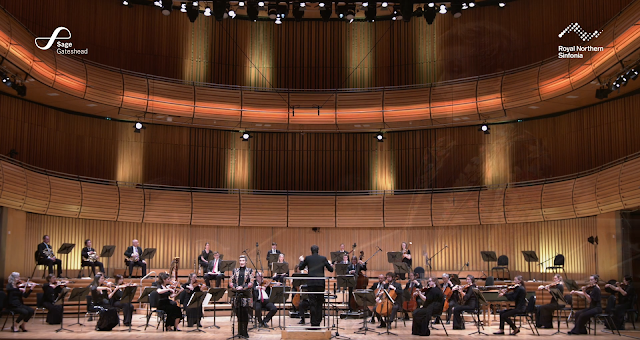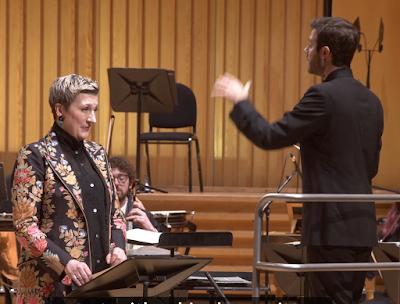 |
| Berlioz: Les nuits d'été - Dame Sarah Connolly, Royal Northern Sinfonia, Dinis Sousa at Sage Gateshead (photo taken from live-stream) |
Haydn, Berlioz, Boulanger, Prokofiev; Sarah Connolly, Royal Northern Sinfonia, Dinis Sousa; Sage Gateshead
Reviewed by Robert Hugill on 16 April 2021
Engagement, excitement and a sense of chamber music detail characterised the young Portuguese conductor's first concert with the Royal Northern Sinfonia since being named as principal conductor
There was an extra excitement to the Royal Northern Sinfonia's concert at Sage Gateshead on Friday 16 April 2021. Not only was it the ensemble's first live concert this year, and the start of Sage Gateshead's New Beginnings season of live concerts, but it was the orchestra's first concert with the young Portuguese conductor Dinis Sousa since he was named as the orchestra's new principal conductor (a post he takes up next season). Under the title Dawn and Dusk, Sousa conducted a programme that moved from Joseph Haydn's early Symphony in D 'Le Matin', to Hector Berlioz' Les nuits d'été with mezzo-soprano Dame Sarah Connolly, to Iain Farrington's arrangement of Lili Boulanger's D'un matin du printemps and ending with Prokofiev's Symphony No. 1 'Classical'. But the programme began with an extra item, Elgar's Elegy played in memory of HRH Prince Philip.
Dinis Sousa studied at the Guildhall School of Music and Drama, where he was Conducting Fellow. Since then he has formed his own ensemble, Orquestra XXI which brings together some of the best yung Portuguese musicians from around Europe. He was worked regularly with the English Baroque Soloists and Orchestre Revolutionnaire et Romantique, being appointed the Monteverdi Choir and Orchestra's first ever assistant conductor, as well as working with modern instrument orchestras.
Haydn's Symphony in D was one of a trio Le matin, Le midi and Le soir, which he wrote shortly after joining the employ of Prince Esterhazy (Haydn would work for the Esterhazy family exclusively for the next 30 years). The first movement began with a lovely sunrise, and employing real chamber forces, Sousa drew stylish playing from his players. In the second movement (where the wind are tacet), there was a chamber elegance to the playing highlighted by the way Haydn writes concerto grosso-like solo passages. Sousa and his players brought a chamber of level of detail to the music along with a sense of engagement, and I look forward to hearing them in lots more Haydn. The minuet was delightfully characterful whilst the trio featured a terrific bassoon solofrom Stephen Reay, whilst the finale went with a zip yet remained full of character.
 |
| Berlioz: Les nuits d'été - Dame Sarah Connolly, Royal Northern Sinfonia, Dinis Sousa at Sage Gateshead (photo taken from live-stream) |
The songs are not so much linked by theme as by the fact that all the texts are by the romantic poet Théophile Gautier (who was a friend of Berlioz), and the each songs partake of what we might call the essence of romanticism, with an overarching theme of unrequited love. The present order of the songs takes us from new-born joy, through loss of innocence to loss of the beloved and perhaps new beginnings.
Though the number of players on stage increased, Sousa and the orchestra kept the sense of chamber detail that they had given us in the Haydn. Instead of Sarah Connolly's voice being supported on a lush carpet of string sound, she was surrounded by a fine web of sound almost chamber music-like at times. The chamber lightness in Villanelle combined with Connolly's wonderful sense of suppressed anticipation and barely contained joie de vivre. Le spectre de la rose was all hushed intimacy, with Connolly mesmerising us with her story-telling. Though grave and sombre, Sur les lagunes was sung tenderly with a lovely restlessness in the strings, and when passion rose textures remained transparent. Absence was intense, yet stylish with beautifully shaped phrases, whilst Au cimitiere was full of grave beauty, with the words flowing fluidly. Throughout the cycle, I was struck not only by Connolly attention to the poetry but the sense of colour she brought to the words. L'ile inconnue brought us to a vivid finish, all colour and movement.
Lili Boulanger wrote D'un matin du printemps in 1917 (the year before hear early death) and it exists in various versions for chamber forces as well as for large orchestra (including triple woodwind). This version from Iain Farrington gives it to chamber orchestra forces. Boulanger's writing created a very distinctive sound-world, full of delicate details and transparent textures, all stylishly rendered.
Finally we returned to the world of Haydn, but with a spice of 20th century with. Prokofiev wrote his Classical Symphony in 1916 and 1917, deliberately combining old and new in a witty way. The first movement was perky, with a wry humour. Sousa and his forces brought out the sense of clock mechanism in the music, yet it was done with great character and sense of enjoyment. The second movement was finely delicate, but articulated with humour and a chamber music sense of detail. The third movement dance (a gavotte not a minuet) started off robust, but evaporated delightfully. And the finale really zipped along, again that sense of a highly characterful clock mechanism.
This was a terrific new beginning in so many ways, and I look forward to being able to catch Sousa and the orchestra live, when this is permitted. As well as conducting, Sousa gave lucid and engaging spoken introductions to the music (his spoken English is a pleasure to listen to). Sousa is planning to move his base to the North East, and he looks set to be a real asset to area.
The blog is free, but I'd be delighted if you were to show your appreciation by buying me a coffee.
- When 2020 forced the cancellation of the first Riga Jurmala Academy in Latvia, it moved its programme of masterclasses on-line: I find out more from director Toms Ostrovskis - interview
- The music positively explodes from the disc: Australian group Ensemble Offspring's Offspring Bites 3:En Masse - record review
- Richard Strauss satirising his publisher & exploring exoticism with vertiginously high vocals: Unerhört (Outrageous) from tenor Daniel Behle and pianist Oliver Schnyder - record review
- Manchester Song Festival: Kathryn Rudge, Kathrine Broderick, and RNCM Songsters at Stoller Hall - concert review
- Towards Perfection: the
idea of an ideal version of an opera has not always played out in
history, with composers being surprisingly willing to rewrite works to
suit circumstances - feature
- Go, not knowing where: I chat to pianist Elan Sicroff about Russian composer Thomas de Hartmann and the Thomas de Hartmann project - interview
- A journey to Anatolia through the ears of The Turkish Five, pioneers of western classical music in Turkey - record review
- Charmes: an
alternative century of song from Olena Tokar and Igor Gryshyn with
music by Alma Mahler-Werfel, Clara Schumann, Pauline Viardot-Garcia and
Vitezslava Kapralova - record review
- 60th birthday celebration: Faroese composer Sunleif Rasmussen's works for recorder player Michala Petri survyed in this engaging and imaginative disc - record review
- Music of sundrie sorts, and to content divers humours: Byrd's 1588 Psalmes, Sonets & songs of sadness and pietie in its first complete recording from Alamire - record review
- Bringing audiences into closer contact with the poetry: tenor Ilker Arcayürek on the art of the song recital and his new disc of Schubert songs - interview
- Scholarship and enjoyment combine in Il Gusto Barocco's lovely fresh account of Bach's Brandenburg Concertos - record review
- Home

No comments:
Post a Comment